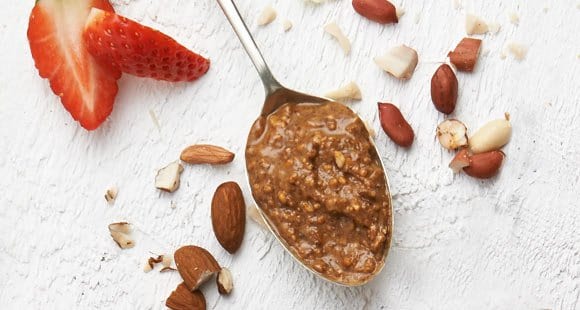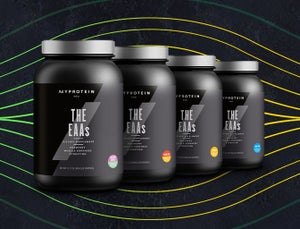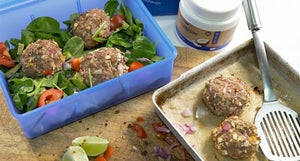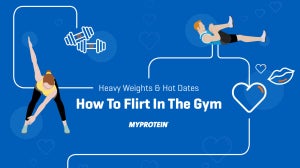For decades, high-fat foods were the black sheep of the fitness industry. It was believed that "fats make you fat", and as a result they were avoided like the plague. The logic was simple- fats have 9 calories per gram while protein and carbs have 4 calories per gram. Therefore, fewer fats equal fewer calories which equals weight loss.
Unfortunately, these once-popular "low-fat" diets neglected the fact that the removal of healthy fats often meant the addition of heavily processed, sugary carbs. These fads were also based on the concept of operating at a pretty major caloric deficit over long periods of time- simply eating less, not eating healthy. While eating next to nothing will make you drop a few pounds right off the bat, it's not sustainable and will ultimately result in gaining all (if not more) of the weight back.
The Resurgence of Fats
Luckily, fats have had a major resurgence in recent years thanks to the Paleo Diet, Ketogenic Diet, Bulletproof Diet, and other higher fat proponents. Healthy fats coming from whole, unprocessed, natural sources can not only help you lose weight, they have the ability to:
? Regulate hormones
? Increase libido
? Improve brain, heart, bone, skin, and eye health
? Raise HDL (good cholesterol) levels and reduce LDL (bad cholesterol) levels
? Strengthen the immune system
? Reduce the risk of cancer and other diseases
Foods High In Healthy Fats
Best of all about fatty foods - they taste great. Here are 5 fatty foods that you should add to your diet immediately, how to implement them, and their macronutrient breakdown:
#1 Avocados
Considered a "superfood", the avocado is one of the healthiest things you can eat. While most fruits are high in sugar and carbs, avocados are low in sugar and high in monounsaturated fat. They're packed with essential nutrients such as potassium (more than a banana) and fiber.
Avocado makes just about any meal better. You can spread it on toast, mix it in a salad, or smash it up to make guacamole. Three delicious ways to incorporate avocado into your regular diet are:
? Sliced on top of an egg and spinach omelet
? Diced with ground beef and sauteed veggies
? Whole, with cottage cheese and Sriracha (a perfect snack before bed)
MacrosCalories = 120
Fat = 10 g
Carbs = 6 g
Protein = 1 g
*Per 1/2 medium avocado

#2 Unsalted Nuts (and Nut Butters)
Nuts are an easy, go-to snack. At a gas station, on the golf course, or at the baseball stadium, nuts are a healthy option in not-so-optimal situations. Almonds, walnuts, cashews, peanuts, pecans, pistachios, and more provide a solid dose of healthy fat along with essential minerals like iron, zinc, and selenium.
While nuts in their standard form are great, nut butters (like peanut and almond butter) are also incredibly healthy. With either option, just keep an eye on the sodium and sugar content. Here are some ways to eat more nuts:
? Pecans sprinkled on top of plain Greek yogurt with some berries and honey.
? Almond butter mixed with oatmeal and protein powder (overnight oats).
? Peanut butter, protein powder, and banana smoothie.
MacrosCalories = 160
Fat = 14 g
Carbs = 7 g
Protein = 5 g
*Per 1/4 cup of unsalted mixed nuts (cashews, almonds, pistachios, pecans)

#3 Extra-Virgin Olive Oil
Olive oil has been regarded as one of the healthiest foods on Earth for centuries, dating back to the days of ancient Greece and even before. A cornerstone of the popular Mediterranean Diet, olive oil is loaded with powerful antioxidants that do everything from reduce inflammation to protect against cardiovascular disease.
Always use extra-virgin, as other types of olive oil are not nearly as healthy. Olive oil can easily be added to your diet by:
? Using it as a dressing for salads.
? Cooking with it
? Adding a serving to a protein shake for extra calories
MacrosCalories = 120
Fat = 14 g
Carbs = 0 g
Protein = 0 g
*Per 1 tbsp. of extra-virgin olive oil

4. Grass-Fed Beef
Grass-fed beef should be a staple item for anyone trying to gain muscle and lose fat. It has a ton of protein and contains all 8 essential amino acids. In addition to vitamins and minerals like zinc and iron, grass-fed beef is rich in CLA and creatine.
A lot of people nowadays have a misinformed notion that red meat is unhealthy, and that to build muscle and lose fat they must eat only white meat. This is simply untrue, and those who don’t eat beef are missing out on a host of benefits not found in chicken or turkey. Stick to grass-fed beef options like these for a powerful dose of protein and healthy animal fat:
? Steak (loins or rounds)
? Lean ground beef (85% lean or better)
? Beef pot roast (slow cooked in a Crock-Pot)
MacrosCalories = 240
Fat = 17 g
Carbs = 0 g
Protein = 21 g
*Per 4 oz. grass-fed ground beef (85% lean)

#5 Butter
Butter IS good for you. There, I said it. I’m not talking about margarine. I’m not talking about that stuff they pour on your popcorn at the movie theater. I’m talking about raw, grass-fed, straight-from-the-cow butter. The real stuff has lots of fat-soluble nutrients including Vitamin K2 (heart health) and butyrate (anti-inflammatory).
Butter was the main antagonist in the “fat is evil” tirade of the past, but thankfully it’s beginning to have a resurgence. Consider this: In 1910, butter consumption was 18 pounds per capita and heart disease rates were below 10%. In 2000, butter consumption was less than 4 pounds per capita and heart disease was the cause of nearly 1 in 4 deaths. So lose the butter-phobia and add it back into your diet like this:
? Put it on steamed vegetables.
? Melt it on steak.
? Add a scoop to morning coffee.
MacrosCalories = 100
Fat = 12 g
Carbs = 0 g
Protein = 0 g
*Per 1 tbsp. grass-fed butter

Take Home Message
The age of fearing fat is over. Quality fats from natural sources help maintain a strong physique, functional brain, and healthy heart. Be sure to eat fats in moderation. As previously mentioned, fat has 9 calories per gram, so a little bit goes a long way. A couple hundred calories-worth of nuts could quickly turn into a full blown meal if you’re not careful. But as long as you control your portions, these fats are a great addition to any diet.
Our articles should be used for informational and educational purposes only and are not intended to be taken as medical advice. If you're concerned, consult a health professional before taking dietary supplements or introducing any major changes to your diet.








